|
|
|
Sort Order |
|
|
|
Items / Page
|
|
|
|
|
|
|
| Srl | Item |
| 1 |
ID:
157594


|
|
|
|
|
| Summary/Abstract |
This article is a collective response to ‘Planet Politics’ by Anthony Burke et al., which was published in this journal in 2016, and billed as a ‘Manifesto from the End of IR’. We dispute this claim on the basis that rather than breaking from the discipline, the Manifesto provides a problematic global governance agenda which is dangerously authoritarian and deeply depoliticising. We substantiate this analysis in the claim that Burke et al. reproduce an already failed and discredited liberal cosmopolitan framework through the advocacy of managerialism rather than transformation; the top-down coercive approach of international law; and use of abstract modernist political categories. In the closing sections of the article, we discuss the possibility of different approaches, which, taking the Anthropocene as both an epistemological and ontological break with modernist assumptions, could take us beyond IR’s disciplinary confines.
|
|
|
|
|
|
|
|
|
|
|
|
|
|
|
|
| 2 |
ID:
096555
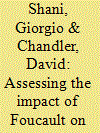

|
|
|
| 3 |
ID:
073684
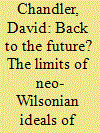

|
|
|
|
|
| Publication |
2006.
|
| Summary/Abstract |
International state-building has become central to international policy concerns and has marked a clear neo-Wilsonian shift in international thinking, spurred by the leadership of the United States and the European Union. Today's approaches insist on the regulatory role of international institutions and downplay the importance of locally-derived political solutions. This privileging of 'governance' over 'government' is based on the assumption that the political process can be externally influenced through the promotion of institutional changes introduced at the state level and pays less attention to how societal pressures and demands are constitutive of stable and legitimate institutional mechanisms. This article questions this approach and analyses the transformation in the assessment of the importance of the societal sphere. It considers how this shift has been shaped by current understandings of war and conflict, and how the prioritisation of governance has fitted with critical and post-positivist trends in academic thinking in international relations and security studies. The discussion is illustrated with examples drawn largely from the Balkans and the international regime in Bosnia-Herzegovina in particular.
|
|
|
|
|
|
|
|
|
|
|
|
|
|
|
|
| 4 |
ID:
172952
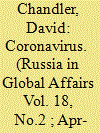

|
|
|
| 5 |
ID:
087318
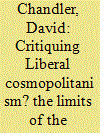

|
|
|
|
|
| Publication |
2009.
|
| Summary/Abstract |
Today there is a widespread recognition of the erosion of political community on the territorial basis of the nation-state. Instead, alternative framings of "being" political or of engaging in politics have argued for a more radical post-territorial space of political possibilities, of what it means to be political, and of how we envision political community. Through focusing on the two dominant articulations of post-territorial political community, liberal cosmopolitan and radical poststructuralist approaches, this article seeks to analyze the possibilities and limitations inherent in the search for political community beyond the boundaries of the nation-state. The aspiration to engage in, construct, or recognize the existence of a post-territorial political community, a community of broader humanity, has been articulated in liberal terms as cosmopolitanism, driven by global civil society, and in poststructuralist terms as "political cosmopolitanism,""cosmopolitanism-to-come" or the "solidarity of the governed," given its force by the creativity of the resistance to liberal universalism of the "multitude." This article seeks to draw out the similarities between these two contrasting approaches, ostensibly based upon either the extension of or the critique of liberal political ontologies.
|
|
|
|
|
|
|
|
|
|
|
|
|
|
|
|
| 6 |
ID:
184481
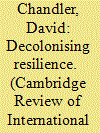

|
|
|
|
|
| Summary/Abstract |
In dominant Eurocentric policy imaginaries, a resilient community is able to self-govern and to autonomously manage risk through becoming more adaptive and responsive to potential threats, mitigating harms and maintaining societal equilibrium; ‘bouncing back’ rapidly to normal conditions. This paper seeks to move the discussion forward, suggesting alternative framings for the conceptualisation of community practices and understandings as part of the project of decolonising approaches to Central Eurasia. In drawing upon recent works addressing resilience via Édouard Glissant’s Poetics of Relation, it highlights alternative understandings of resilience which are less subject-centred and more dependent upon becoming with others in relation. Crucial to these practices of relationality is the recognition of opacity - the acceptance that uncertainty and unknowability are integral to life processes and provide a vital invitation or opportunity to experiment and adapt through improvisation rather than mechanically responding to feedback effects in ways which close off alternative possibilities for change.
|
|
|
|
|
|
|
|
|
|
|
|
|
|
|
|
| 7 |
ID:
058593
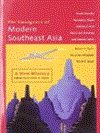

|
|
|
|
|
| Publication |
Honolulu, University of Hawaii, 2005.
|
| Description |
xxiii, 541p.: maps, tablespbk
|
| Standard Number |
0824828909
|
|
|
|
|
|
|
|
|
|
|
|
Copies: C:1/I:0,R:0,Q:0
Circulation
| Accession# | Call# | Current Location | Status | Policy | Location |
| 049074 | 959/OWE 049074 | Main | On Shelf | General | |
|
|
|
|
| 8 |
ID:
073298
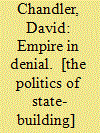

|
|
|
|
|
| Publication |
London, Pluto Press, 2006.
|
| Description |
xii, 221p.
|
| Standard Number |
0745324282
|
|
|
|
|
|
|
|
|
|
|
|
Copies: C:1/I:0,R:0,Q:0
Circulation
| Accession# | Call# | Current Location | Status | Policy | Location |
| 051576 | 327.11/CHA 051576 | Main | On Shelf | General | |
|
|
|
|
| 9 |
ID:
095178


|
|
|
|
|
| Publication |
2010.
|
| Summary/Abstract |
This article suggests that EU governance in Southeastern Europe reproduces a discourse in which the failures and problems which have emerged, especially in relation to the pace of integration and the sustainability of peace in candidate member states such as Bosnia-Herzegovina, have merely reinforced the EU's external governance agenda. On the one hand, the limitations of reform have reinforced the EU's projection of its power as a civilising mission into what is perceived to be a dangerous vacuum in the region. On the other hand, through the discourse of post-liberal governance, the EU seeks to avoid the direct political responsibilities associated with this power. Rather than legitimise policy making on the basis of representative legitimacy, post-liberal frameworks of governance problematise autonomy and self-government, inverting the liberal paradigm through establishing administrative and regulatory frameworks as prior to democratic choices. This process tends to distance policy making from representative accountability, weakening the legitimacy of governing institutions in Southeastern European states which have international legal sovereignty but lack genuine mechanisms for politically integrating society.
|
|
|
|
|
|
|
|
|
|
|
|
|
|
|
|
| 10 |
ID:
062346
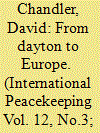

|
|
|
| 11 |
ID:
050172
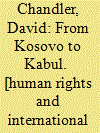

|
|
|
|
|
| Publication |
London, Pluto Press, 2002.
|
| Description |
xvii, 268p.
|
| Standard Number |
0745318843
|
|
|
|
|
|
|
|
|
|
|
|
Copies: C:1/I:0,R:0,Q:0
Circulation
| Accession# | Call# | Current Location | Status | Policy | Location |
| 046483 | 341.481/CHA 046483 | Main | On Shelf | General | |
|
|
|
|
| 12 |
ID:
068164
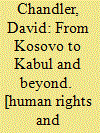

|
|
|
|
|
| Publication |
London, Ploto Press, 2006.
|
| Description |
vii, 290p.
|
| Standard Number |
0745325041
|
|
|
|
|
|
|
|
|
|
|
|
Copies: C:1/I:0,R:0,Q:0
Circulation
| Accession# | Call# | Current Location | Status | Policy | Location |
| 050989 | 341.481/CHA 050989 | Main | On Shelf | General | |
|
|
|
|
| 13 |
ID:
125076
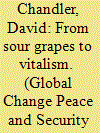

|
|
|
|
|
| Publication |
2013.
|
| Summary/Abstract |
He does not spend too much time on drawing the links with Operaismo/Workerism as a post- 1956 reaction against the Italian Communist Party (PCI), especially in the theoretical and political work around the time of Quaderni Rossi ('Red Notebooks', 1961-65), Classe Operaia ('Working Class', 1963-66) and the organization Potere Operaio, or the generalization of anti-party calls for self-activity beyond the mass factory to the 'social factory' in the Italian autonomist movements of the 1970s. Some background would have allowed readers to appreciate how the shift from workerism in the 1960s to the autonomia/autonomist movement of the late 1970s, enabled the Italian Left to give 1968 student lifestyle radicalism a Marxist makeover: rather than an individualist, student-centred understanding of the world, workers in everyday life and struggle made the world and provided the life-giving creative vital forces which capitalism sought to be both parasitical upon and to artificially contain. Here sociology was the key discipline of critique: blurring the political/economic divide of Stalinist determinism and rejecting the party's possession of 'objective' understandings of economic bases, structures and contradictions.
|
|
|
|
|
|
|
|
|
|
|
|
|
|
|
|
| 14 |
ID:
059989
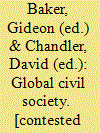

|
|
|
|
|
| Publication |
Abingdon, Routledge, 2005.
|
| Description |
xi, 205p.
|
| Series |
Routledge advances in international relations and global politics; no. 32
|
| Standard Number |
0415354803
|
|
|
|
|
|
|
|
|
|
|
|
Copies: C:1/I:0,R:0,Q:0
Circulation
| Accession# | Call# | Current Location | Status | Policy | Location |
| 049334 | 300/BAK 049334 | Main | On Shelf | General | |
|
|
|
|
| 15 |
ID:
093672
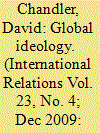

|
|
|
|
|
| Publication |
2009.
|
| Summary/Abstract |
Many commentators appear to take for granted the fact that the sphere of political power and contestation has shifted from the national level to the global level. This article seeks to question the assumptions made about politics at the global level, highlighting the elision of 'global politics' with the globalisation of the political. It will be suggested that major changes have taken place in terms of political subjectivity and how we view political community, blurring the lines of distinction between the domestic and international realms. The understanding of these changes in primarily spatial terms - from the level of the nation state to the global - mystifies the qualitative shift in political consciousness, political engagement and political instrumentality involved. In fact, the relationship between political subjectivity and the external world is inversed. The Global Ideology posits material changes at the global level as the explanatory factor for the breakdown of state-based forms of political identification and collective engagement, understanding these changes as marking the birth of global politics. In relocating this shift in consciousness in the attenuation of political engagement and collective identification it is possible to explain the shift in political subjectivity in terms of the globalisation of the political - as the result of our more individuated relationship to our external world.
|
|
|
|
|
|
|
|
|
|
|
|
|
|
|
|
| 16 |
ID:
091649
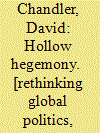

|
|
|
|
|
| Publication |
London, Pluto Press, 2009.
|
| Description |
ix, 255p.
|
| Standard Number |
9780745329208
|
|
|
|
|
|
|
|
|
|
|
|
Copies: C:1/I:0,R:0,Q:0
Circulation
| Accession# | Call# | Current Location | Status | Policy | Location |
| 054483 | 327.1/CHA 054483 | Main | On Shelf | General | |
|
|
|
|
| 17 |
ID:
145979
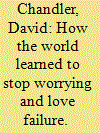

|
|
|
|
|
| Summary/Abstract |
In modernity, failure was the discourse of critique, today, it is increasingly the discourse of power: failure has changed its allegiances. Over the last two decades, failure has been enfolded into discourses of power, facilitating the development of new policy approaches. Foremost among governing approaches that seek to include and to govern through failure is that of resilience. This article seeks to reflect upon how the understanding of failure has become transformed in this process, particularly linking this transformation to the radical appreciation of contingency and of the limits to instrumental cause-and-effect approaches to rule. Whereas modernity was shaped by a contestation over failure as an epistemological boundary, under conditions of contingency and complexity there appears to be a new consensus on failure as an ontological necessity. This problematic ‘ontological turn’ is illustrated using examples of changing approaches to risks, especially anthropogenic understandings of environmental threats, formerly seen as ‘natural’.
|
|
|
|
|
|
|
|
|
|
|
|
|
|
|
|
| 18 |
ID:
124617
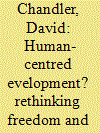

|
|
|
|
|
| Publication |
2013.
|
| Summary/Abstract |
Today's dominant discourses of international development increasingly focus on human agency as the measure of development in terms of individual capabilities. The individualised understanding of development takes a 'human-centred' or 'agent-orientated' view of the barriers to development. This article seeks to critically engage with the view of the human and of human agency articulated within this approach. In this discourse, development is taken out of a macro-political-economy context, in which development policies are shaped by social and political pressures or state-led policies. Foucault's insights on the rearticulation of power - shifting from the state-based, sovereign and disciplinary approaches of government ruling over society, towards the biopolitical or 'human-centred' approaches of governance through social processes - will be used to critically engage with the capabilities approach. This article genealogically draws out the changing nature of Western discourses of development and the understanding of policy practices as promoting the empowerment of the post-colonial other in order to examine how development and autonomy have been radically differently articulated in discourses of Western power and how today's discursive framing feeds on and transforms colonial and early post-colonial approaches to the human subject.
|
|
|
|
|
|
|
|
|
|
|
|
|
|
|
|
| 19 |
ID:
052440
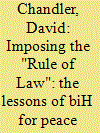

|
|
|
| 20 |
ID:
062344
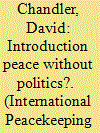

|
|
|
|
|
|
|
|